必修五 Unit 1单词拼写
- 格式:doc
- 大小:18.50 KB
- 文档页数:2

高中英语必修5单词表Unit1高中英语必修5单词表Unit 1学英语,最重要的就是词汇,词汇构成了所有,只有把单词背熟了,才能通顺的读完整篇文章。
下面是店铺精心整理的高中英语必修5单词表Unit 1,欢迎大家分享。
1. characteristic n. 特征;特性2. radium n. 镭3. painter n. 画家;油漆匠4. *put forward 提出5. scientific adj. 科学的6. *conclude v.结束7. conclusion n.结论8. *draw a conclusion得出结论9. analyse v.分析10. infect v.传染11. infectious adj.传染的12. defeat v. 打败13. expert adj.熟练的 n. 专家14. *attend v.照顾15. physician n.医生16. *expose v.暴露17. *expose...to使显露18. deadly adj.致命的19. *cure n.治愈 cure sb of sth20. outbreak n.爆发21. *challenge n.挑战22. victim n.受害者23. absorb v.吸收24. *suspect v.怀疑25. inquiry n.询问26. neighbourhood n.附近 neighborhood27. severe adj.严重的28. clue n.线索29. pump n.泵30. foresee v.预见---foresaw-foreseen31. investigate v.调查32. investigation n.调查33. *blame v.责备34. *pollute v.污染35. *handle n.柄36. germ n.微生物37. *link v.连接38. *link...to... 将…和…联系或连接起来39. *announce n.宣布 announcement n. 宣布40. certainty n.确信41. instruct v.命令 instruction n. 指示;指令 construct v. 建设;建造 construction n. 建设42. responsible adj.有责任的 irresponsible adj. 不负责责任的responsibility n. 责任43. construct v.建设44. construction n.建设45. *contribute v.捐献to doing sth. make contributions to doing sth46. *apart from 除……之外47. firework n.烟火48. chart n.图表49. creative adj.有创造力的 creativity n. 创造力 creation n. 创造create v.创造50. co-operative adj.合作的 co-operation n. 合作51. positive adj.积极的 neutral adj. 中立的' negative adj. 消极的52. *(be) strict with sb.对……严格的 be strict in sth 在某方面要求严格53. revolutionary adj.革命的 revolution n. 革命54. movement n.移动55. *make sense讲得通56. backward adj.向后的57. loop n.圈58. privately adv.私下地59. *spin v.(使)旋转---spun---spun60. brightness n.明亮 bright adj.61. enthusiastic adj.热情的 enthusiasm n.热情 be enthusiastic about sb/sth 对……充满热情62. cautious adj.小心的---caution n. 小心63. *reject v.拒绝64. universe n.宇宙---universal adj. 普遍的;宇宙的。
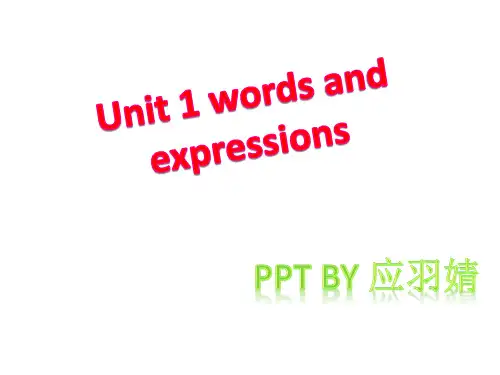
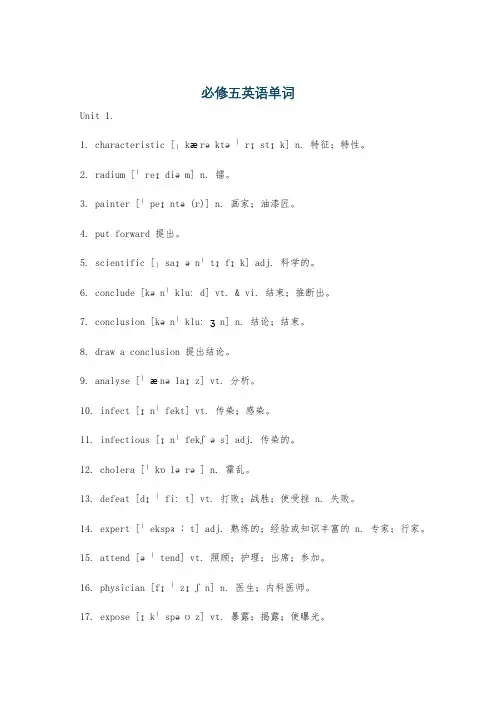
必修五英语单词Unit 1.1. characteristic [ˌkærəktəˈrɪstɪk] n. 特征;特性。
2. radium [ˈreɪdiəm] n. 镭。
3. painter [ˈpeɪntə(r)] n. 画家;油漆匠。
4. put forward 提出。
5. scientific [ˌsaɪənˈtɪfɪk] adj. 科学的。
6. conclude [kənˈkluːd] vt. & vi. 结束;推断出。
7. conclusion [kənˈkluːʒn] n. 结论;结束。
8. draw a conclusion 提出结论。
9. analyse [ˈænəlaɪz] vt. 分析。
10. infect [ɪnˈfekt] vt. 传染;感染。
11. infectious [ɪnˈfekʃəs] adj. 传染的。
12. cholera [ˈkɒlərə] n. 霍乱。
13. defeat [dɪˈfiːt] vt. 打败;战胜;使受挫 n. 失败。
14. expert [ˈekspɜːt] adj. 熟练的;经验或知识丰富的 n. 专家;行家。
15. attend [əˈtend] vt. 照顾;护理;出席;参加。
16. physician [fɪˈzɪʃn] n. 医生;内科医师。
17. expose [ɪkˈspəʊz] vt. 暴露;揭露;使曝光。
18. expose...to 使显露;暴露。
19. deadly [ˈdedli] adj. 致命的。
20. cure [kjʊə(r)] n. 治愈;痊愈 vt. 治愈;治疗。
21. outbreak [ˈaʊtbreɪk] n. 爆发;发作(尤指疾病或战争)22. challenge [ˈtʃælɪndʒ] n. 挑战 vt. 向……挑战。
23. victim [ˈvɪktɪm] n. 受害者。
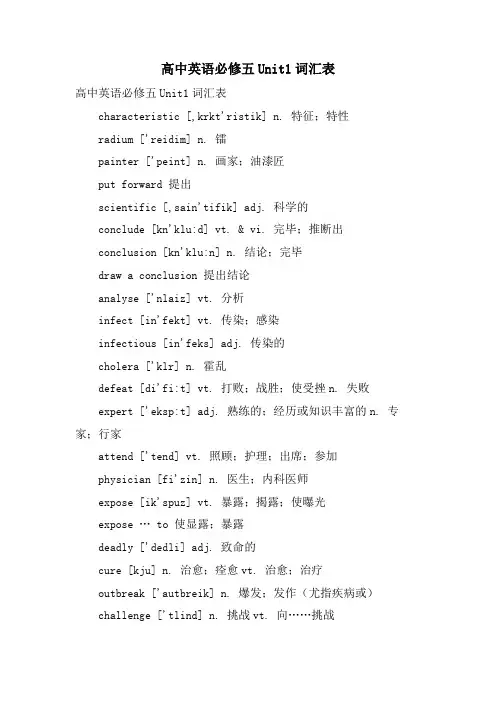
高中英语必修五Unit1词汇表高中英语必修五Unit1词汇表characteristic [,krkt'ristik] n. 特征;特性radium ['reidim] n. 镭painter ['peint] n. 画家;油漆匠put forward 提出scientific [,sain'tifik] adj. 科学的conclude [kn'klu:d] vt. & vi. 完毕;推断出conclusion [kn'klu:n] n. 结论;完毕draw a conclusion 提出结论analyse ['nlaiz] vt. 分析infect [in'fekt] vt. 传染;感染infectious [in'feks] adj. 传染的cholera ['klr] n. 霍乱defeat [di'fi:t] vt. 打败;战胜;使受挫n. 失败expert ['eksp:t] adj. 熟练的;经历或知识丰富的n. 专家;行家attend ['tend] vt. 照顾;护理;出席;参加physician [fi'zin] n. 医生;内科医师expose [ik'spuz] vt. 暴露;揭露;使曝光expose … to 使显露;暴露deadly ['dedli] adj. 致命的cure [kju] n. 治愈;痊愈vt. 治愈;治疗outbreak ['autbreik] n. 爆发;发作(尤指疾病或)challenge ['tlind] n. 挑战vt. 向……挑战victim ['viktim] n. 受害者absorb [b'z:b] vt. 吸收;吸引;使专心suspect [s'spekt]/['sspekt]vt. 疑心n. 被疑心者;嫌疑犯enquiry [in'kwairi] n. 询问neighbourhood ['neibhud] n. 附近;邻近severe [si'vi] adj. 严重的;剧烈的;严厉的clue [klu:] n. 线索;提示pump [pmp] n. 泵;抽水机vt. (用泵)抽(水)Cambridge Street 剑桥大街foresee [f:'si:] vt. 预见;预知investigate [in'vestieit] vt. & vi. 调查investigation [in,vesti'ein] n. 调查blame ['bleim] vt. 责备;谴责n. 过失;责备pollute [p'lu:t] vt. 污染;弄脏handle ['hndl] n. 柄;把手vt. 处理;操纵germ [d:m] n. 微生物;细菌link [lik] vt. & n. 连接;联系link … to … 将……和……联系或连接起来announce ['nauns] vt. 宣布;通知certainty ['s:tnti] n. 确信;确实instruct [in'strkt] vt. 命令;指示;教导responsible [ri'spnsbl] adj. 有责任的;负责的construct [kn'strkt] vt. 建立;修建construction [kn'strkn] n. 建立;建筑物contribute [kn'tribju:t] vt. & vi. 捐献;奉献;捐助apart from 除……之外;此外firework ['faiw:k] n. 烟火(燃放)chart [t:t] n. 图表creative [kri'eitiv] adj. 有创造力的;创造性的;独创的co-operative [ku'prtiv] adj. 合作的positive ['pztiv] adj. 积极的;肯定的';确实的(be) st rict with … 对……严格的revolutionary [,rev'lju:nri] adj. 革命的;重大变革的movement ['mu:vmnt] n. 移动;运动;动作make sense 讲得通;有意义backward ['bkwd] adv. & adj. 向后地(的);相反地(的);退步地(的)loop [lu:p] n. 圈;环privately ['praivitli] adv. 私下地;秘密地spin [spin] vi. & vt. (使)旋转;纺(线或纱)brightness ['braitnis] n. 明亮;亮度;聪颖enthusiastic [in,θju:zi'stik] adj. 热情的;热心的cautious ['k:s] adj. 小心的;慎重的reject [ri'dekt] vt. 回绝;不承受;抛弃universe ['ju:niv:s] n. 宇宙;世界。
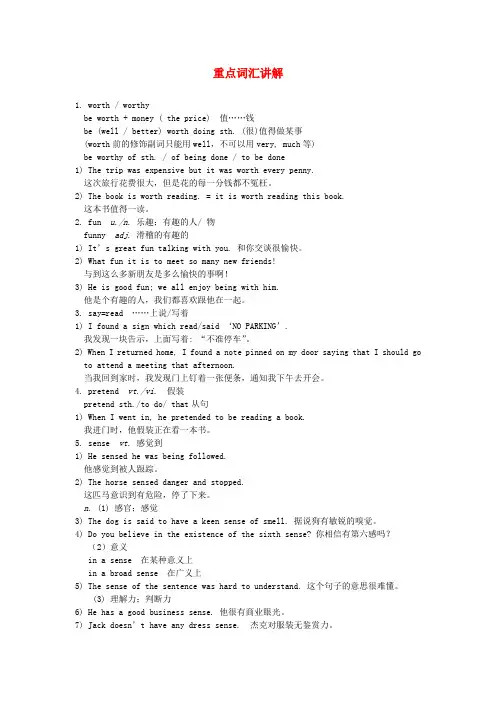
重点词汇讲解1. worth / worthybe worth + money ( the price) 值……钱be (well / better) worth doing sth. (很)值得做某事(worth前的修饰副词只能用well,不可以用very, much等)be worthy of sth. / of being done / to be done1) The trip was expensive but it was worth every penny.这次旅行花费很大,但是花的每一分钱都不冤枉。
2) The book is worth reading. = it is worth reading this book.这本书值得一读。
2. fun u./n.乐趣;有趣的人/ 物funny adj.滑稽的有趣的1) It’s great fun talking with you. 和你交谈很愉快。
2) What fun it is to meet so many new friends!与到这么多新朋友是多么愉快的事啊!3) He is good fun; we all enjoy being with him.他是个有趣的人,我们都喜欢跟他在一起。
3. say=read ……上说/写着1) I found a sign which read/said ‘NO PARKING’.我发现一块告示,上面写着: “不准停车”。
2) When I returned home, I found a note pinned on my door saying that I should go to attend a meeting that afternoon.当我回到家时,我发现门上钉着一张便条,通知我下午去开会。
4. pretend vt./vi. 假装pretend sth./to do/ that从句1) When I went in, he pretended to be reading a book.我进门时,他假装正在看一本书。
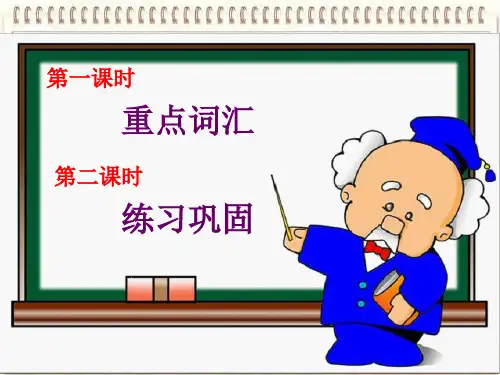
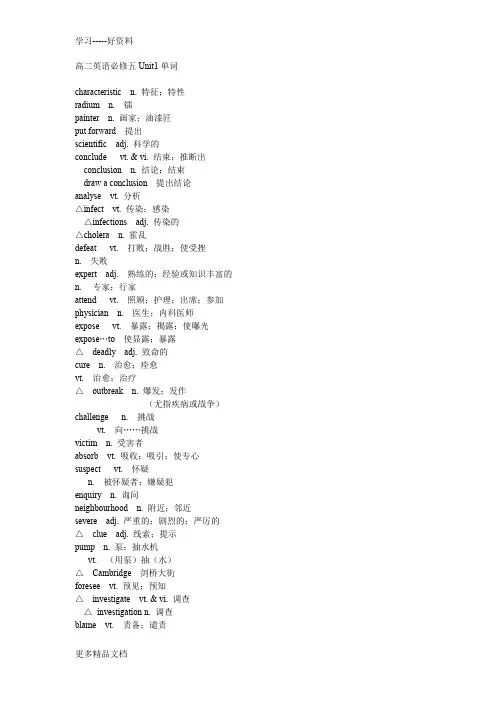
高二英语必修五Unit1单词characteristic n. 特征;特性radium n. 镭painter n. 画家;油漆匠put forward 提出scientific adj. 科学的conclude vt. & vi. 结束;推断出conclusion n. 结论;结束draw a conclusion 提出结论analyse vt. 分析△infect vt. 传染;感染△infections adj. 传染的△cholera n. 霍乱defeat vt. 打败;战胜;使受挫n. 失败expert adj. 熟练的;经验或知识丰富的n. 专家;行家attend vt. 照顾;护理;出席;参加physician n. 医生;内科医师expose vt. 暴露;揭露;使曝光expose…to 使显露;暴露△deadly adj. 致命的cure n. 治愈;痊愈vt. 治愈;治疗△outbreak n. 爆发;发作(尤指疾病或战争)challenge n. 挑战vt. 向……挑战victim n. 受害者absorb vt. 吸收;吸引;使专心suspect vt. 怀疑n. 被怀疑者;嫌疑犯enquiry n. 询问neighbourhood n. 附近;邻近severe adj. 严重的;剧烈的;严厉的△clue adj. 线索;提示pump n. 泵;抽水机vt. (用泵)抽(水)△Cambridge 剑桥大街foresee vt. 预见;预知△investigate vt. & vi. 调查△investigation n. 调查blame vt. 责备;谴责△过失;责备pollute vt. 污染;弄脏handle n. 柄;把手vt. 处理;操纵△germ n. 微生物;细菌link vt. & n. 连接;联系link…to…将……和……联系或连接起来announce vt. 宣布;通知△certainty n. 确信;确实instruct vt. 命令;指示;教导△responsible adj. 有责任的;负责的construct vt. 建设;修建construction n. 建设;建筑物contribute vt. & vi. 捐献;贡献;捐助apart from 除……之外;此外firework n. 烟火(燃放)chart n. 图表△creative adj. 有创造力的;创造性的;独创的△co-operative adj. 合作的positive adj. 积极的;肯定的;确实的(be)strict with…对……严格的△Nicolaus Copernicus 尼古拉?哥白尼(波兰天文学家)△revolutionary adj. 革命的;重大变革的movement n. 移动;运动;动作make sense 讲得通;有意义backward adv. & adj. 向后地(的);相反地(的);退步地(的)△loop n. 圈;环△privately adv. 私下地;秘密地spin vi. & vt. (使)旋转;纺(线或纱)△brightness n. 明亮;亮度;聪颖enthusiastic adj. 热情的;热心的cautious adj. 小心的;谨慎的reject vt. 拒绝;不接受;抛弃universe n. 宇宙;世界。
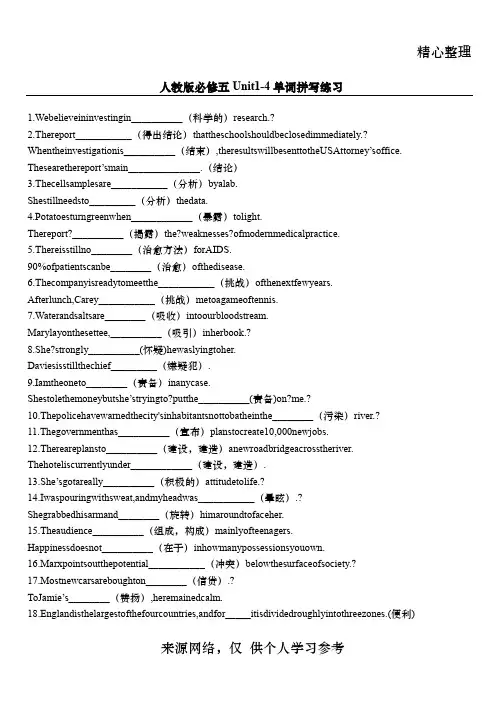
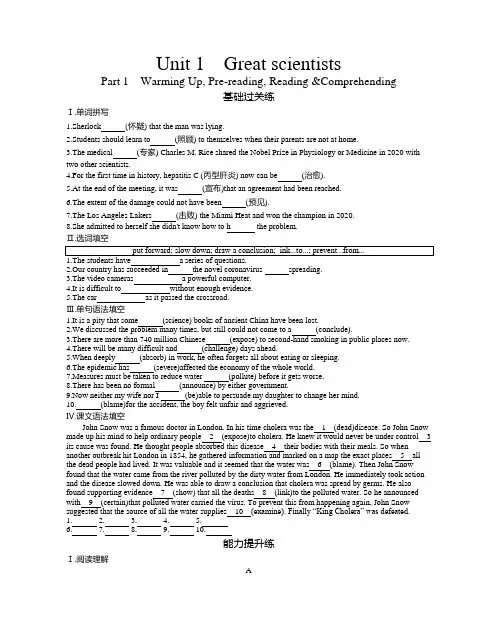
Unit 1Great scientistsPart 1Warming Up, Pre-reading, Reading &Comprehending基础过关练Ⅰ.单词拼写1.Sherlock(怀疑) that the man was lying.2.Students should learn to(照顾) to themselves when their parents are not at home.3.The medical(专家) Charles M. Rice shared the Nobel Prize in Physiology or Medicine in 2020 with two other scientists.4.For the first time in history, hepatitis C (丙型肝炎) now can be(治愈).5.At the end of the meeting, it was(宣布)that an agreement had been reached.6.The extent of the damage could not have been(预见).7.The Los Angeles Lakers(击败) the Miami Heat and won the champion in 2020.8.She admitted to herself she didn't know how to h the problem.Ⅱ.选词填空2.Our country has succeeded in the novel coronavirus spreading.3.The video cameras a powerful computer.4.It is difficult to without enough evidence.5.The car as it passed the crossroad.Ⅲ.单句语法填空1.It is a pity that some(science) books of ancient China have been lost.2.We discussed the problem many times, but still could not come to a(conclude).3.There are more than 740 million Chinese(expose) to second-hand smoking in public places now.4.There will be many difficult and(challenge) days ahead.5.When deeply(absorb) in work, he often forgets all about eating or sleeping.6.The epidemic has(severe)affected the economy of the whole world.7.Measures must be taken to reduce water (pollute) before it gets worse.8.There has been no formal(announce) by either government.9.Now neither my wife nor I (be)able to persuade my daughter to change her mind.10.(blame)for the accident, the boy felt unfair and aggrieved.Ⅳ.课文语法填空John Snow was a famous doctor in London. In his time cholera was the1(dead)disease. So John Snow made up his mind to help ordinary people2(expose)to cholera. He knew it would never be under control3 its cause was found. He thought people absorbed this disease4their bodies with their meals. So when another outbreak hit London in 1854, he gathered information and marked on a map the exact places5all the dead people had lived. It was valuable and it seemed that the water was6(blame). Then John Snow found that the water came from the river polluted by the dirty water from London. He immediately took action and the disease slowed down. He was able to draw a conclusion that cholera was spread by germs. He also found supporting evidence7(show) that all the deaths8(link)to the polluted water. So he announced with9(certain)that polluted water carried the virus. To prevent this from happening again, John Snow suggested that the source of all the water supplies10(examine). Finally “King Cholera” was defeated.1. 2. 3. 4. 5.6. 7. 8. 9. 10.能力提升练Ⅰ.阅读理解A(2021河北沧州高二上月考,)If you were asked to imagine a scientist, what image would come to your mind? The idea that most of the kids have is a man wearing a white lab coat with messy hair, big glasses, and cups of colorful liquids giving off clouds of smoke. As for adults, the majority regard scientists as strange people who spend a lot of time working in a lonely lab. However, the reality is quite different.Recently I've had a chance to take part in a scientific experience far from my lab and into Costa Rica. It has a large amount of wildlife due to its geographical placement between North and South America. It is home to more than 500,000 species (物种), which represents nearly 4% of the species worldwide!First we worked to protect wildlife at a leatherback turtle (棱皮龟) protection center. We helped the volunteers to remove rubbish from the beach to create a safe environment for turtle eggs to come out. After that we stayed at Arenal Volcano where we studied crustal(地壳的) activity linked to earthquakes. During our stay at Arenal, we rode over the mountainous areas and took a long walk through the rainforest. On the last day we got a professional introduction of rocket (火箭) science and learned about new rocket technology that will be used on the international space station.During my Costa Rica experience, I know that being a scientist doesn't mean working in a lab day and night. A scientist is the one who loves learning and getting a better understanding of the world from helping protect wildlife, learning about earthquakes or inventing rockets. I think that science is so much more than wearing a lab coat and mixing chemicals. Kids need to be aware of the excitement and adventures science can bring!1.According to Paragraph 1, scientists are often believed.A.to do experiments in messy labsB.to spend too much time in labsC.to wear clothes in a different wayD.to work in dangerous conditions2.What did the author do in Costa Rica?A.He experienced an earthquake.B.He took part in rocket experiments.C.He picked up rubbish on the beach.D.He helped the volunteers collect turtle eggs.3.What does the author learn about science from his Costa Rica experience?A.Science is full of boring experiments.B.Science is related to chemical liquids.C.Science is more than working in a lab.D.Science is about wildlife and earthquakes.4.What is the best title for the passage?A.What a Scientist Is likeB.Where a Scientist WorksC.How I Traveled in Costa RicaD.Why I Chose to Study ScienceB(2020黑龙江鹤岗一中高二上期末,)Inventor, physicist, surveyor, astronomer, biologist, artist...Robert Hooke was all these and more. Some say he was the most outstanding experimental scientist of the 17th century. In the course of his work, he cooperated with famous men of science like Isaac Newton, and the great architect Christopher Wren.Hooke's early education began at home, under the guidance of his father. He entered Westminster School at the age of 13, and from there went to Oxford, where he came in contact with some of the best scientists in England. Hooke impressed them with his skills at designing experiments and inventing instruments. In 1662, at the age of 28, he was named Curator of Experiments at the newly formed Royal Society of London—meaning that he was responsible for demonstrating (展示) new experiments at the society's weekly meeting. Hooke accepted the job, even though he knew that the society had no money to pay him!Watching living things through a microscope was one of his favourite pastimes. He invented a compound microscope for this purpose. One day while observing a cork (软木塞) under a microscope, he saw honeycomb-like structures. There were cells—the smallest units of life. In fact, it was Hooke who invented the term “cell” as the box-like cells of the cork reminded him of the cells of a monastery (修道院).Another achievement of Hooke's is his book Micrographia, which introduces the enormous potential of the microscope. It contains fascinating drawings of the thing he saw under the microscope. The book also includes, among other things, ideas on gravity, light and combustion (燃烧) that may have helped scientists like Newton when they were developing their own theoretical frameworks on these phenomena.Hooke made a valuable contribution to astronomy too. A crater on the moon is named after him in honour of his service to this branch of science.5.Why did Hooke accept the job as Curator of Experiments?A.He liked designing experiments.B.His family needed his support.C.His parents couldn't afford his education.D.He wanted to please some famous scientists.6.What does the underlined word “pastimes” in Paragraph 3 mean?A.Jobs.B.Experiments.C.Hobbies.D.Structures.7.What can we know about Hooke?A.He went to Oxford in 1645.B.He was well paid at the Royal Society of London.C.He made a contribution to medicine.D.His book Micrographia may have helped Newton.8.Which word can be used to describe Hooke?A.Honest.B.Creative.C.Reliable.D.Modest.Ⅱ.七选五(2020河南师大附中高二上期末,)How to Succeed in ScienceTo succeed in science, you need a lot more than luck. In my view, you have to combine intelligence with a willingness not to follow conventions when they block your forward path. Thus, these have come to be my rules for success.1That might sound proud, but the fact is that you must always turn to people who are brighter than you. It's like playing any game. Even as a child, I never wanted to play games with anyone who was as bad as I was. If you win, it will give you no pleasure. And in the game of science or life, the highest goal isn't simply to win; it's to win at something really difficult. 2.Take risksTo make a huge success, a scientist has to be prepared to get into deep trouble. If you are going to make a huge jump in science, you will very likely be unqualified to succeed by definition. 3. This can be more than personally upsetting.Never do anything that bores youMy experience in science is that someone is always telling you to do things, and then leaves you alone. I'm not good enough to do well in something I dislike. 4.It's very hard to succeed if you don't want to be with other scientists, because you have to go to key meetings where you spot key facts that would have escaped you. And you have to chat with your competitors, even if you find them objectionable.So my final rule is: 5.A.Meet challenges with great courageB.If you can't stand being with your real peers, get out of scienceC.Put another way, it's to go somewhere beyond your ability and come out on topD.Be sure you always have someone to save you from a deep messE.Avoid foolish peopleF.In fact, I find it hard to do well in something I likeG.Besides, you even have to be prepared to disbelieve your scientific heroes1. 2. 3. 4. 5.答案全解全析Unit 1Great scientistsPart 1Warming Up, Pre-reading,Reading &Comprehending基础过关练Ⅰ.1.suspected 2.attend 3.expert 4.cured 5.announced6.foreseen7.defeated8.handleⅡ.1.put forward 2.preventing;from 3.are linked to 4.draw a conclusion 5.slowed downⅢ.1.scientific考查形容词。
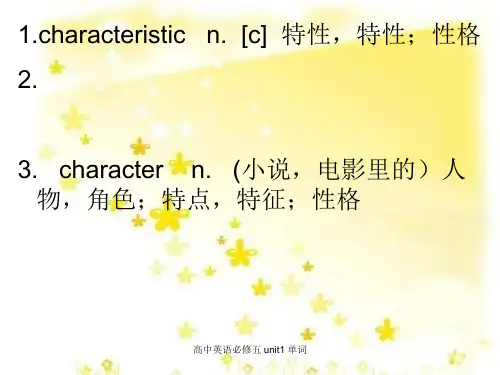
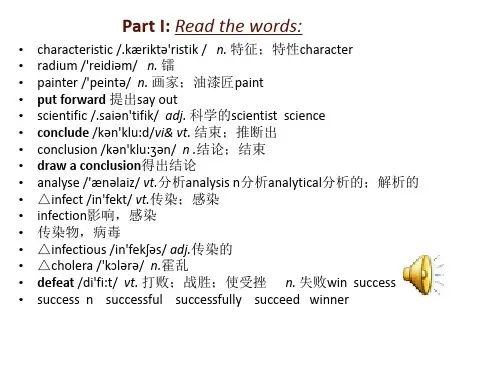
characteristic /kæriktə'ristik/ n. 特征;特性adj.特有的;典型的character n. 性格;品质;特征radium /'reidiəm/ n. 镭painter /'peintə/ n. 画家;油漆匠put forward 提出put up 举起建造张贴put down 记下写下put out 扑灭put off 推迟延期put on 穿上put up with 忍受put away 收拾scientific /saiən'tifik/ adj. 科学的science n.科学scientist n. 科学家conclude /kən'klu:d/ vt. & vi. 结束;推断出The doctor concluded that the patient's disease was cancer.The meeting concluded at 10 o’clock. conclude by doing/with sth. 以......而结束He concluded his speech with a song/by singing a song.conclude from... 从......推出结论What do you conclude from these facts? conclusion /kən'klu:ʒn/ n. 结论;结束draw a conclusion = conclude提出结论in conclusion = to conclude最后To conclude/in conclusion, I wish you all happy.analyse /'ænəlaiz/ vt. 分析analysis n. 分析△ infect /in'fekt/ vt. 传染;感染△ infectious /in'fekʃəs/ adj. 传染的infectiously adv. 传染地infectiousness n. 传染性△ cholera /'kɔlərə/ n. 霍乱defeat /di'fi:t/ vt. 打败;战胜;使受挫n. 失败defeat/beat/winbeat 比赛中战胜defeat 比赛战胜/战场战胜win 取胜;赢得+ game/war/prize/battle....expert /'ekspə:t/ adj. 熟练的;经验知识丰富的n. 专家;行家an expert on ...方面的专家be expert at (具体的事务)be expert in (指领域,方面,较宽泛)attend /ə'tend/ vt. 照顾;护理;出席;参加attend (on) sb照顾护理attend sth出席参加attend to sth 专心于...attend/join/join in/take part inattend 参加(会议,课程,婚礼...)join 加入(组织,党派,军队...)join in 参加(某些小型活动)take part in 参加(某些大型活动)join sb in doing sth 与某人一起干某事physician /fi'ziʃn/ n. 医生;内科医师physic vt. 给…服药;治愈n. 医学;药品physical adj.身体的;物质的;物理的expose /ik'spəuz/ vt. 暴露;揭露;使曝光expose … to 使显露;暴露be exposed to ...暴露于The singer’s personal life is exposed to some newspapers.△ deadly /'dedli/ adj. 致命的cure /kjuə/ n. 治愈;痊愈vt. 治愈;治疗a cure for sth 治疗...的办法cure sb of ... 治愈某人的疾病,纠正某人坏习惯treat/curetreat 侧重过程,不表示结果treat sb for sth cure 侧重结果,指治愈cure sb of sth△ outbreak /'autbreik/ n. 爆发;发作challenge /'tʃælindʒ/ n. 挑战vt. 向……挑战victim /'viktim/ n. 受害者absorb /əb'zɔ:b/ vt. 吸收;吸引;使专心absorb ... into ... 吸收,兼并,把...并入...The drug is absorbed into your body quickly. The big company absorbed the small companies into its organazition.be absorbed in sth = absorb oneself in sth专心于...I was absorbed in reading and didn’t hear your call.I absorbed myself in reading and didn’t hear your call.suspect /sə'spekt/ vt. 怀疑/'sʌspekt/ n. 被怀疑者;嫌疑犯suspect ... of ... 认为...有...的嫌疑They suspected him of the murder.suspect/doubtsuspect 怀疑干了doubt 怀疑没干,不相信干了I suspect that he has stolen my wallet.我怀疑他偷了我的钱包。
Period Two Language PointsⅠ.单词拼写1.We can conclude from what he said that he is a good manager.2.The babies are well attended to in the nursery.3.The police suspected that someone had broken into the house and stolen the picture.4.The river has been polluted by all kinds of industrial waste.5.The new canal will link the two rivers.6.Two teachers will instruct(教导) and take care of the students after class.7.Plants absorb(吸收) carbon dioxide from the air and release oxygen.8.My mother was very severe(严厉的) with me.9.The role will be the biggest challenge(挑战) of his acting career.10.It is hard to foresee(预知) what will happen.Ⅱ.句型转换1.There was a serious accident yesterday. Luckily nobody died.Luckily, there was no death in the serious accident that happened yesterday.2.Time lost will return no more.Time lost won’t return any more.3.The man seen by us yesterday is Professor Smith.The man who/that was seen by us yesterday is Professor Smith.4.It seemed that everyone was satisfied.Everyone seemed to be satisfied.5.He sold his bike so that he could have money to buy food.To have money to buy food,he sold his bike.Ⅲ.词义辨析1.用defeat, beat或win的适当形式填空。
高二年级英语必修五单词表(第一单元)高二年级英语必修五单词表(第一单元)1 characteristic 特征;特征n.2 radium 镭n.3 painter 画家n.4 put forward 提出5 scientific 科学的adj.6 conclude 结束;推断出vt.&vi.7 conclusion 论断;结束n.8 draw a conclusion 患上出论断9 analyse 分析vt. 10 infect 传染;传染vt. 11 infectious 传染的adj. 12 cholera 霍乱n. 13 defeat 打败;受挫;使战胜vt.失败n. 14 expert 熟练的;经验或者奥博的adj.专家;里手n. 15 attend 赐顾帮衬;护理;盛大出席;参加vt. 16 physician 大夫;内科医师n. 17 expose 暴露;揭破;使曝光vt. 18 expose…to 使显露;暴露vt. 19 deadly 致命的adj. 20 cure 治愈;痊愈n.治愈;疗治vt. 21 outbreak 爆发;发作n. 22 challenge 挑战n.向……挑战vt. 23 victim 受害者n. 24 absorb 吸收;吸引;使用心vt. 25 suspect 思疑vt.被思疑者;嫌疑人n. 26 enquiry 扣问n. 27 neighborhood 附近;邻近n. 28 severe 严重的;剧烈的;严厉的adj. 29 clue 线索;提示n. 30 pump 泵;缩水机n.(用泵)抽(水)vt. 31 Cambridge street 剑桥大街 32 foresee 遇见,预知vt. 33 investigate 调查vt.&vi. 34 investigation 调查n.35 blame 责备;谴责vt.过失;责备n. 36 pollute 污染;搞脏vt.37 handle 柄;把儿n.措置惩罚;把持vt. 38 germ 微有生命的物质;细菌n.39 link 毗连;接洽n. 40 link...to... 将……以及……接洽或者毗连起来 41 announce 宣布;通告vt. 42 certainty 确信;确实n. 43 instruct 命令;指示;辅导vt. 44 responsible 有责任的;卖力的adj. 45 construct 设置装备摆设;修建vt. 46 construction 设置装备摆设;建筑物n. 47 contribute 捐募;孝敬;捐助vt.&vi. 48 apart from 除……以外;此外 49 firework 炊火(使爆发)n. 50 chart 图表n. 51 creative 有创造力的;创造性的;独创的adj. 52 co-operative 互助的adj. 53 positive 踊跃的;肯定的;确实的adj. 54 be strict with... 对于……严酷的 55 Nicolaus Copernicus 尼古拉.哥白尼(波兰天思想家) 56 revolutionary 革命的;重大变革的adj. 57 movement 移动;运动;动作n. 58 make sense 讲患上通;有意义 59 backward 向后的(地);相反的(地);退步的(地)adj.&adv. 60 loop 圈;环n. 61 privately 暗里地;奥秘地adv. 62 spin (spun,spun)(使)扭转;纺(线或者纱)vt.&vi. 63 brightness 明亮;亮度;聪颖n. 64 enthusiastic 热忱的;热肠的adj. 65 cautious 小心的;谨慎的adj. 66 reject 拒绝;不接管;丢弃vt. 67 universe 宇宙;世界n.。
单词音标词性expert [ˈeksp ə:t ]n.painter [ˈpeint ə]n.physician [fi ˈzi ʃən ]n.suspect [ˈs ʌspekt ]n.victim[ˈviktim ]n.Nicolaus Copernicus chart [t ʃɑ:t ]n.cholera[ˈk ɔl ər ə]n.construction n.firework [ˈfai əw ə:k ]n.germ [d ʒə:m ]n.handle [ˈhændl ]n.loop [lu:p ]n.pump [p ʌmp ]n.radium[ˈreidi əm ]n.characteristic [ˌkærikt əˈristik ]n.clue[klu:]n.universe[ˈju:niv ə:s ]n.neighbourhood [ˈneib əhud ]n.Cambridge Street [ˈkeimbrid ʒ]blame [bleim ]n.certainty [ˈs ə:t ənti ]n.challenge [ˈt ʃælind ʒ]n.conclusion [k ən ˈklu:ʒən ]n.cure [kju ə]n.defeat [di ˈfi:t ]n.enquiry[in ˈkwai əri ]n.investigation n.link[li ŋk ]n.movement [ˈmu:vm ənt ]n.outbreak[ˈautbreik ]n.属性类名词brightness[ˈbraitnis ]n.指人的具体名词指物的具体名词指地点的名词指人或物的行为conclude[k ən ˈklu:d ]vi.contribute [k ən ˈtribju:t ]vi.investgate[in ˈvestigeit ]vi.spin[spin ]vi.draw a conclusion make senseabsorb [əb ˈs ɔ:b ]vt conclude [k ən ˈklu:d ]vt analyse [ˈæn əlaiz ]vt.announce [əˈnauns ]vt.attend [əˈtend ]vt.blame [bleim ]vt.challenge [ˈt ʃælind ʒ]vt.construct [k ən ˈstr ʌkt ]vt.contribute [k ən ˈtribju:t ]vt.cure [kju ə]vt.defeat [di ˈfi:t ]vt.expose [ik ˈsp əuz ]vt.foresee [f ɔ:ˈsi:]vt.handle[ˈhændl ]vt.infect [in ˈfekt ]vt.instruct [in ˈstr ʌkt ]vt.investgate [in ˈvestigeit ]vt.link [li ŋk ]vt.pollute [p əˈlu:t ]vt.pump [p ʌmp ]vt.reject [ri ˈd ʒekt ]vt.spin [spin ]vt.suspect [ˈs ʌspekt ]vt.(be) strict with…expose…to [ik ˈsp əuz ]link…to…[li ŋk ]put forward backward [ˈbækw əd ]adj.cautious [ˈk ɔ:ʃəs ]adj.co-operative[ˈɔp ər ətiv ]adj.人或物之间发生了些什么人或物发生了什么creative [kri:ˈeitiv ]adj.deadly[ˈdedli ]adj.enthusiastic[in ˌθju:zi ˈæstik ]adj.expert[ˈeksp ə:t ]adj.infectious [in ˈfek ʃəs ]adj.positive [ˈp ɔz ətiv ]adj.responsible [ri ˈsp ɔns əb əl ]adj.revolutionary [ˌrev əˈlu:ʃən əri ]adj.scientific [ˌsai ən ˈtifik ]adj.severe[si ˈvi ə]adj.backward(s)[ˈbækw əd ]adv.privately [ˈpraivitli ]adv.apart from描述人和物的状态副词及其他翻译专家;行家画家;油漆匠医生;内科医师被怀疑者;嫌疑犯受害者尼古拉.哥白尼(波兰天文学家)图表霍乱建设;建筑物烟火(燃放)微生物;细菌柄;把手圈;环泵;抽水机镭特征;特性线索;提示宇宙;世界附近;邻近剑桥大街过失;责备确信;确实挑战结束;结论治愈;痊愈失败询问调查连接;联系移动;运动;动作爆发;发作(尤指疾病或战争)明亮;亮度;聪颖结束;推断出捐献;贡献;捐助调查(spun,spun)旋转;纺(线或纱)得出结论讲得通;有意义吸引;吸收;使专心结束;推断出分析宣布;通告照顾;护理;出席;参加责备;谴责向。
高二必修五Unit 1考前单词拼写
1. The need to communicate is a key _____________ (特征) of human society.
2. She is not only a famous scientist in the world, but also a gifted ________ (画家).
3. They are carrying out a ___________ (科学的) experiment to look for a cure for the disease.
4. We c_________ the party by singing the popular song:“Yesterday Once More.”
We finally reached the__________ (结束) that parents are the best teachers of their children.
5. The teachers were busy ____________(分析) how to improve the students’ spoken English.
6. After eight years of fighting, the Chinese people finally ________(打败) the Japanese enemies.
7. Some________(专家) think that language learning is much easier for children as their tongues are more flexible.
8. About 3000 students from our school _____ (出席) the lecture given by the famous professor.
9.It is unwise to leave children __________ (接触) to violence on the Internet.
10. That accident ___________ (治愈) him of carelessness.
11. The role will be one of the biggest ____________ (挑战) of his acting career.
12. The writer was so________(专心于) in her work that she didn’t notice Jim enter the room.
13. He _________ (怀疑) that the woman staying in the flat above was using heroin.
______________ (怀疑) nothing, he walked right into the trap.
14. She grew up in a quiet _______________(街区,社区) of Boston.
15. His injuries were __________ (严重的) and he was rushed to hospital.
16. Many disasters such as earthquakes cannot be _________(预知).
17. He got _________ (责备) about losing the money.
18. _________ (污染) water and air are harmful to our health.
19. I turned the ________(把手) and opened the door.
We think that the affairs of a country must be ________(处理) by its own people.
20. The ____________(通告) came as no great surprise.
The spokesman of the Foreign Ministry __________ (宣布) the news to the reporters waiting in the hall.
21. When you take this medicine,you should follow the ___________ (说明) on the bottle.
Greater effort is needed to ___________(教导) children in road safety.
22. Work has been begun on the ___________ (建设) of the new airport.
23. It was generous of her to _________(捐助) such a large sum of money.
China has made a great c__________(贡献) to global economic recovery.
24. They're encouraged to think _________(积极地) about themselves and their future.
25. She grabbed Norm’s arm and _________(使旋转) him around to face her.
26. All the staff are ____________(热情的,热衷的) about the project.
27. The government has been _________ (谨慎的) in its response to the report..
28. He asked me to lend him more money, but I __________ (拒绝) his request.
考前单词答案
Unit 1
1.characteristic 2.painter 3. scientific 4.concluded; conclusion 5.analysing/analyzing 6. defeated 7. experts 8. attended 9. exposed 10. cured 11. challenges1
2. absorbed 1
3. suspected; Suspecting 1
4. neighborhood/neighbourhood 1
5. severe 1
6. foreseen 1
7. blamed 1
8. Polluted 1
9. handle; handled 20. announcement;announced 21. instructions; instruct 22.construction 23. contribute;contribution 24. positively 25. spun 26. enthusiastic 27. cautious 28. rejected。